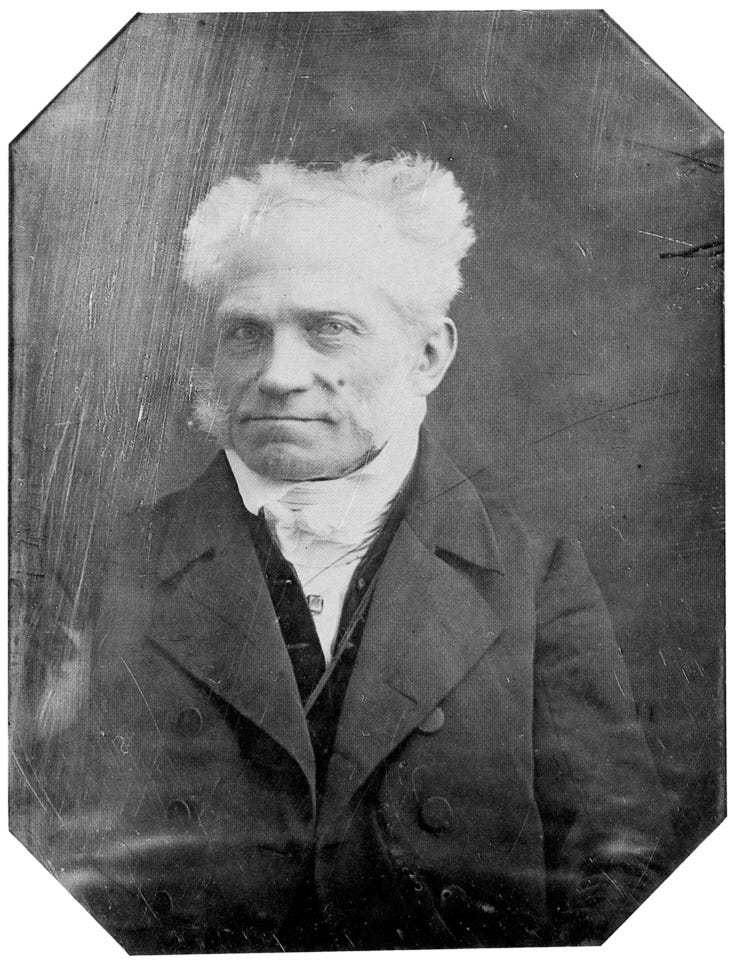Schopenhauer and Pataesthetics
S. E. Armstrong
Alfred Jarry
I need to start wth a word about Alfred Jarry (1873-1907). He was a French writer associated with the Symbolists, a movement often categorized as having a deep faith in the power of metaphor to reveal truth. André Breton considered Jarry a precursor to Surrealism.
woodcut print of Ubu Roi by Alfred Jarry
Jarry is most famous for the character Ubu Roi, King Turd in French, a rapacious sociopath and paragon of the discreet charm of the Bourgeoisie.1 But the work I find more mature, interesting, and also relevant to this discussion is Exploits & Opinions of Dr. Faustroll, Pataphysician,“An epiphenomenon being often accidental, pataphysics will be, above all, the science of the particular, despite the common opinion that the only science is that of the general. Pataphysics will examine the laws governing exceptions, and will explain the universe supplementary to this one.”2
My copy of Faustroll, definitely a fun read with the potential for a movie as difficult to achieve as anything by Hunter S. Thompson or William S. Burroughs
And now we get to Arthur Schopenhauer with a quote from The World as Will and Representation, “All genuine art proceeds from knowledge of perception, never from the concept”.3 To clarify the provenance of ideas, Schopenhauer predates Jarry by a generation and incidentally, to justify my love of Schopenhauer with an ad hominem argument, he is also esteemed by interesting thinkers such as Albert Einstein.
Arthur Schopenhauer, 1845
Schopenhauer’s preference for the specific over the general leads me to Alfred Jarry’s ‘pataphysics, the science of exceptions. And the apostrphe on the front of ‘pataphysics isn’t my mistake, it’s intentional on Jarry’s part, but my understanding of French syntax is much too feeble to offer any suggestions about it’s meaning.
Schopenhauer’s idea suggests that an art experience is a matter of a “Pataesthetics” (my neologism), an experiential knowledge of exceptions rather than rules. Press experience, and squeeze it to reveal what we desire and assume. Desire creates the world, and desire is interested in the extraordinary. This might sound mysterious but it really isn’t, in fact it’s completely simple. The knowledge of experience is the relevant knowledge. It’s about the person doing the knowing, as well as the thing that’s known. On the other hand, all that can be gained from knowledge of the concept is a ‘just-so’ story with a measure of plausibility. Understanding a concept is a framework where the experience of particulars can be hung to dry, and a framework is a cage. And to throw one final log on this little fire: With experience, I can find Duchamp’s and Sontag's eros, c’est la vie. More on that another time.
The Discreet Charm of the Bourgeoisie was also the title of a film by Luis Buñuel
Alfred Jarry, Exploits & Opinions of Dr. Faustroll, Pataphysician, Simon Watson Taylor trans., (Boston: Exact Change, 1996), p. 21.
Arthur Schopenhauer, The World as Will and Representation, vol. 1, E. F. J. Payne trans., (New York: Dover Publications, 1966), p. 57.









I agree, Schopenhauer’s point only holds for art that is 100% perceptual, but to squirm a bit about it, I think it could also apply to an art form that’s referencing experience
Schopenhauer’s quote ‘an experiential knowledge of exceptions rather than rules’ is a good general base to start personal creation from but falls short
( now) of many contemporary artists working in completely dissimilar ways.